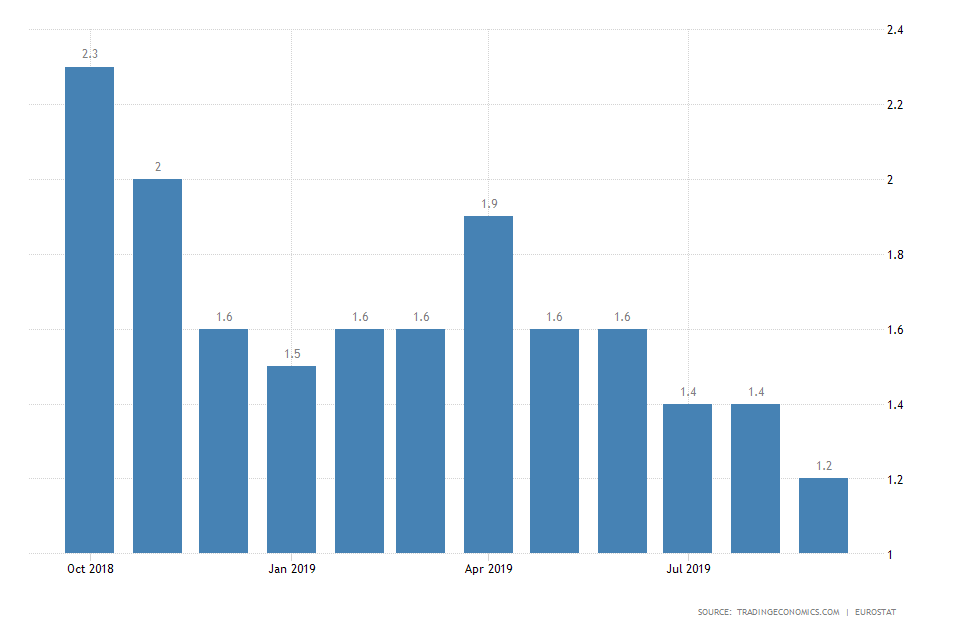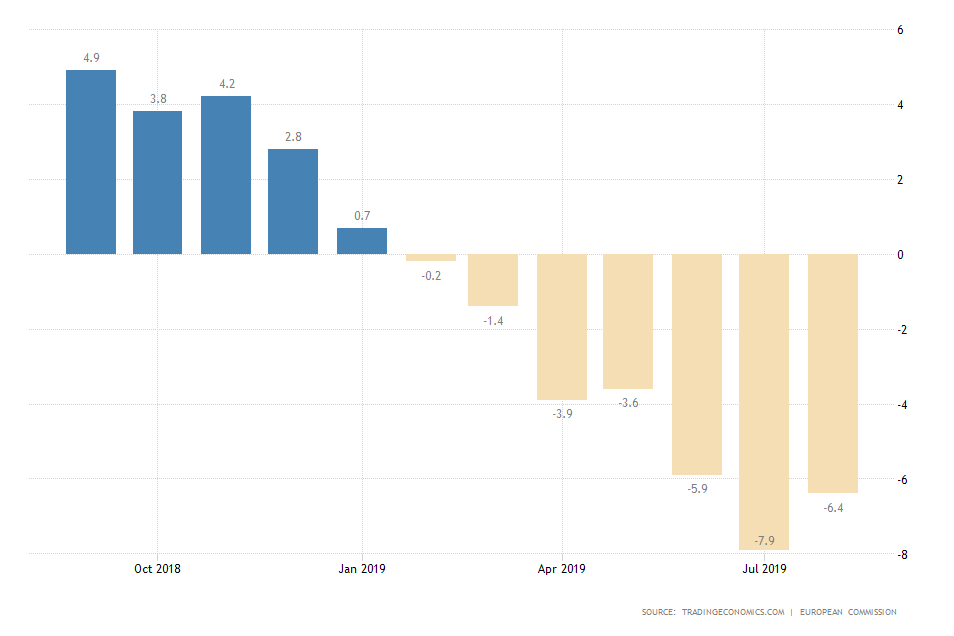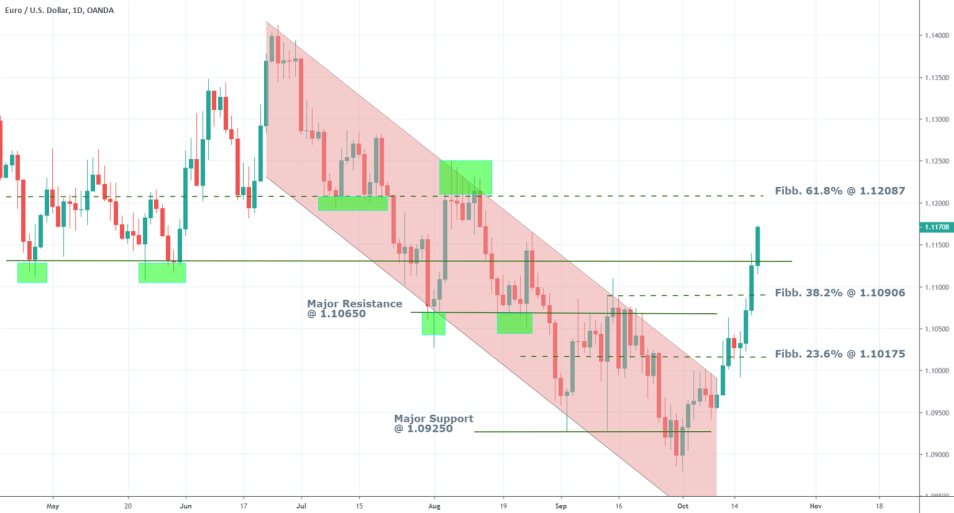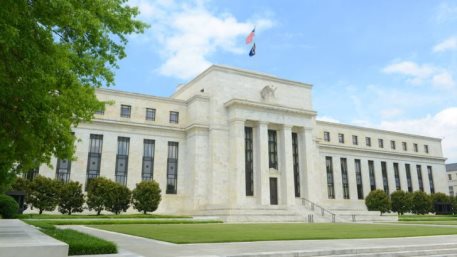
The Governing Council of the European Central Bank is gathering this Thursday to deliberate on the current state of the bloc’s monetary policy.
The general market consensus indicates that the primary interest rate –the interest rate on the main refinancing operations - is likely to be maintained unchanged at the current 0.00 per cent level.
In the last monetary policy statement from the 12th of September, released after the meeting at the Governing Council of the ECB, were published the expectations about interest rate levels:
“The Governing Council now expects the key ECB interest rates to remain at their present or lower levels until it has seen the inflation outlook robustly converge to a level sufficiently close to, but below, 2% within its projection horizon, and such convergence has been consistently reflected in underlying inflation dynamics.”
Since then the general inflation rate has actually deteriorated, which has raised some concerns amongst investors, some of whom now expect the ECB to implement an even more accommodative monetary stance.
At the time of the last monetary policy decision, the inflation rate in the bloc was recorded at 1.4 per cent, however, since then it was observed that the rate had lessened by 0.2 percentage points to 1.2 per cent, in September.

Thus, the Council might be hard-pressed to act now and deter the current trend of waning price stability across the 28 member-states by cutting the interest rate on the deposit facility, which is already negative at -0.50 per cent.
Cheaper borrowing rates could help improve the dwindling business confidence rate, which is currently suffering from the prolongation of the trade war and the ever-growing Brexit uncertainty.

It was just revealed on Saturday that Boris Johnson’s trade deal proposal was defeated at the House of Commons, which compelled the PM to request a new extension of the Brexit deadline until the 31st of January 2020.
Overall, the Governing Council of the ECB has to weigh in on the likelihood of the UK's eventual departure from the EU, happening without an agreed-upon trade deal.
In that sense, the Council has to take into account similar non-economic factors for its monetary policy decision on Thursday.
The EURUSD has appreciated with more than 1.20 per cent during last week’s trading session on the hopes of investors that Boris Johnson and Jean-Claude Junker’s trade proposal could be ratified in Parliament.
However, its dismissal on Saturday means that uncertainty surrounding Brexit will return on Monday as the market opens, and the Euro is likely to correct some of the gains it registered last week.

Trendsharks Premium
Gold is undergoing a correction, as investors take profits to offset losses from falling stock prices, impacting their margins. However, we anticipate a renewed wave of [...]
The Swiss stock market index is mirroring its global counterparts, such as Germany 40 and US100, experiencing a sharp decline following the announcement of new [...]
We’re analyzing the weekly chart to grasp the broader market trend. Over the past three years, the US30 index has surged by 17,000 points, often resembling a nearly straight [...]
Over the past week, the DAX has experienced a sharp decline, plunging by an astonishing 3,400 points. This downward movement is not isolated, as its international counterparts, such as the UK100 and US100, are also facing significant [...]
EURUSD recently formed a double top at 1.0930, signaling a potential trend reversal, and has since begun a correction. After a 600-pip rally since early March, a pullback at this stage is both expected and healthy. Given these conditions, we are placing a [...]
Since early March, EURJPY has surged nearly 1,000 pips, providing us with several excellent trading opportunities. However, as the rally matures, many early buyers are beginning to take profits, leading to a noticeable slowdown in the uptrend. On Friday, the pair formed a [...]
The AUDJPY currency pair continues to be dominated by bullish momentum, as multiple golden cross patterns reaffirm the strength of the ongoing uptrend. Despite this, we are witnessing a much-needed [...]
The EURAUD currency pair appears to be undergoing a trend reversal, signaling a potential shift in market direction. A notable technical development is the formation of a Death Cross on the chart, a widely recognized bearish indicator that typically suggests a [...]
After securing an impressive 200-pip profit last week, the EURJPY currency pair is now undergoing a southward correction, retracing some of its recent gains. Despite this temporary pullback, the Golden Cross remains intact, reinforcing our view that the overall trend continues to be [...]
The appearance of a Golden Cross in Silver strengthens our analysis that the metal is currently in a strong uptrend, indicating further bullish momentum in the market. This technical pattern, where the short-term moving average crosses above the [...]
This trade presents a considerable level of risk and can be classified as an opportunistic move based on recent price action. The GBPUSD currency pair has experienced a substantial bullish rally, surging by nearly 500 pips in a strong upward movement. However, after this extended period of appreciation, the pair is showing signs of a potential [...]
The anticipated Death Cross on the SMI20 appears to be failing as price finds strong support at the 23% Fibonacci retracement level. After testing this area, the index has shown bullish strength, printing several large green candles, signaling an increase in [...]
A Golden Cross has just appeared on the USDJPY chart, signaling a potential bullish move. This technical pattern occurs when the 20 period moving average crosses above the 60 period moving average, a widely recognized indication of increasing [...]
After 2 months of a down trend, we finally see some indications of price recovery for Oil. The golden cross, a historic buy signal, supports this [...]
For the past month, the German DAX40 has experienced a remarkable 10% surge, reflecting strong bullish momentum. Despite ongoing market volatility and frequent pullbacks, every dip continues to attract fresh buyers, reinforcing the [...]
Oil continues its downward trajectory, despite occasional pullbacks. The overall trend remains bearish, reinforced by multiple Death Cross patterns, a classic sell signal indicating further weakness. Adding to this bearish outlook, the critical [...]
Over the past few days, gold has experienced a sharp decline of more than $100. This downturn can be attributed in part to traders securing profits to manage their margins, which are under strain due to the significant drop in major indices. Currently, gold has fallen below the [...]
The NASDAQ 100 index is showing strong bullish momentum, as evidenced by the formation of a Golden Cross on the chart. This classic buy signal occurs when the short moving average crosses above the long term moving average, suggesting that upward momentum is [...]
The EURAUD currency pair has encountered a significant resistance level, failing to break above the critical 61% Fibonacci retracement level. This suggests that bullish momentum is weakening, reinforcing the case for a potential downward move. Given this technical setup, we favor entering a [...]
The UK100 is experiencing a remarkable rally! Over the past few weeks, the British stock market index has surged nearly 800 points. Each minor dip has attracted more buyers, fueling the bullish momentum. However, since last week, we’ve observed a slight [...]




















